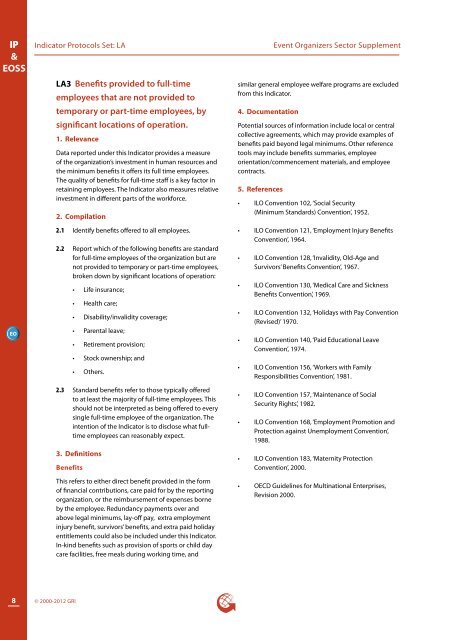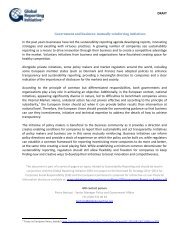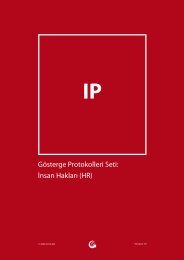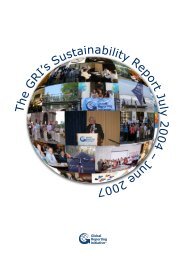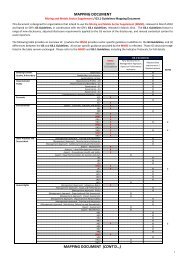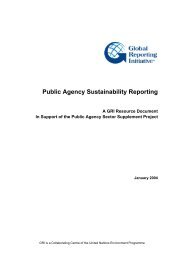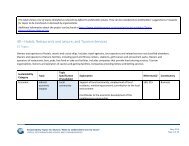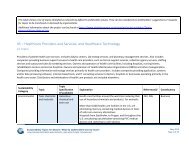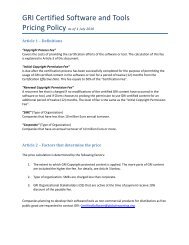Event Organizers Sector Supplement - Global Reporting Initiative
Event Organizers Sector Supplement - Global Reporting Initiative
Event Organizers Sector Supplement - Global Reporting Initiative
You also want an ePaper? Increase the reach of your titles
YUMPU automatically turns print PDFs into web optimized ePapers that Google loves.
IP<br />
&<br />
EOSS<br />
EO<br />
Indicator Protocols Set: LA<br />
LA3 Benefits provided to full-time<br />
employees that are not provided to<br />
temporary or part-time employees, by<br />
significant locations of operation.<br />
1. Relevance<br />
Data reported under this Indicator provides a measure<br />
of the organization’s investment in human resources and<br />
the minimum benefits it offers its full time employees.<br />
The quality of benefits for full-time staff is a key factor in<br />
retaining employees. The Indicator also measures relative<br />
investment in different parts of the workforce.<br />
2. Compilation<br />
2.1 Identify benefits offered to all employees.<br />
2.2 Report which of the following benefits are standard<br />
for full-time employees of the organization but are<br />
not provided to temporary or part-time employees,<br />
broken down by significant locations of operation:<br />
• Life insurance;<br />
• Health care;<br />
• Disability/invalidity coverage;<br />
• Parental leave;<br />
• Retirement provision;<br />
• Stock ownership; and<br />
• Others.<br />
2.3 Standard benefits refer to those typically offered<br />
to at least the majority of full-time employees. This<br />
should not be interpreted as being offered to every<br />
single full-time employee of the organization. The<br />
intention of the Indicator is to disclose what fulltime<br />
employees can reasonably expect.<br />
3. Definitions<br />
Benefits<br />
This refers to either direct benefit provided in the form<br />
of financial contributions, care paid for by the reporting<br />
organization, or the reimbursement of expenses borne<br />
by the employee. Redundancy payments over and<br />
above legal minimums, lay-off pay, extra employment<br />
injury benefit, survivors’ benefits, and extra paid holiday<br />
entitlements could also be included under this Indicator.<br />
In-kind benefits such as provision of sports or child day<br />
care facilities, free meals during working time, and<br />
<strong>Event</strong> <strong>Organizers</strong> <strong>Sector</strong> <strong>Supplement</strong><br />
similar general employee welfare programs are excluded<br />
from this Indicator.<br />
4. Documentation<br />
Potential sources of information include local or central<br />
collective agreements, which may provide examples of<br />
benefits paid beyond legal minimums. Other reference<br />
tools may include benefits summaries, employee<br />
orientation/commencement materials, and employee<br />
contracts.<br />
5. References<br />
• ILO Convention 102, ‘Social Security<br />
(Minimum Standards) Convention’, 1952.<br />
• ILO Convention 121, ‘Employment Injury Benefits<br />
Convention’, 1964.<br />
• ILO Convention 128, ‘Invalidity, Old-Age and<br />
Survivors’ Benefits Convention’, 1967.<br />
• ILO Convention 130, ‘Medical Care and Sickness<br />
Benefits Convention’, 1969.<br />
• ILO Convention 132, ‘Holidays with Pay Convention<br />
(Revised)’ 1970.<br />
• ILO Convention 140, ‘Paid Educational Leave<br />
Convention’, 1974.<br />
• ILO Convention 156, ‘Workers with Family<br />
Responsibilities Convention’, 1981.<br />
• ILO Convention 157, ‘Maintenance of Social<br />
Security Rights’, 1982.<br />
• ILO Convention 168, ‘Employment Promotion and<br />
Protection against Unemployment Convention’,<br />
1988.<br />
• ILO Convention 183, ‘Maternity Protection<br />
Convention’, 2000.<br />
• OECD Guidelines for Multinational Enterprises,<br />
Revision 2000.<br />
8<br />
© 2000-2012 GRI


